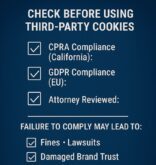I didn’t vote for George Bush in his second term; truth be told, I wasn’t that keen on him his first term, but found him better than the alternative. But despite this opinion, I never felt it fair to blame him for all the awful events that happened on his watch. The Crash of 2000, Katrina, Enron, MCI, the sub-prime mess, 9/11, I’m sure I’m missing a few. Sure, they happened while he was president, but the seeds for all these events were planted long before he got to the White House. He just turned out to be the unluckiest president ever.
Now, I’m starting to get the same feeling about how some very vocal computer users are starting to criticize Flash. Slow performance? Must be Flash. Instability? Flash. Slow to load a web page? Gotta be Flash. Fan whirring? Flash.
Sure, like all big lies there are some seeds of truth in these accusations, but let’s look at the overarching facts. Flash is on 98% or so of all computers – perhaps I’m naive, but technologies that totally suck – both absolutely and compared to other available technologies – don’t achieve this kind of success. If you look at the rhetoric about Flash, you’d think it was a Toyota-sized problem, with product recalls and Congressional inquiries. But there aren’t any.
Then there’s my own personal experience. I work on Mac and Windows computers all day long, from 8-core workstations to much less powerful notebooks on both platforms. I’m pretty passionate about computing and vocal about my concerns. But Flash as an offensive technology – a “dreaded plug-in” – never made my radar screen. Vista? Heck yeah – I wrote two columns about my dislike of that OS. But Flash? No, it’s installed on all my computers and always seem to work just fine.
Plus, I remember the truly offensive technologies that Flash replaced. I could get very passionate about hating the RealPlayer, which wanted to own my computer from MIME types to background processes. But there was a time where you couldn’t live without it. Ditto with Windows Media Player, which is the most consistently disappointing program I can think of. Then came Flash – it was small, it was discrete, it didn’t try to take over your computer. You could brand, you could customize, and then came VP6 and later H.264 and the video finally was gorgeous. You could build animation and then later sophisticated rich internet applications around it. Hey, it was so good, so pervasive, so successful, that Microsoft created Silverlight to compete against it.
Seriously, if you had to rate the top technologies that helped make Internet video possible – both historically and currently – could Flash not be #1? Now there’s a public hate-fest about Flash – at least among some technical cognescenti — though it’s usually prosecuted by those with a clear alternative agenda, whether it’s the web would be “better” if it was completely open source and non-proprietary, or simply protecting App Store revenue. Hey, if that’s your agenda, promote that — don’t denigrate Flash.
The other disturbing parallel for me in this Bush/Flash comparison is the blind assumption that the newer alternative will be superior. I voted for President Obama, but it wasn’t because I believed his campaign promises. I just concluded that (once again) he was the better of two poor alternatives. Now, 18 months later, Guantanamo is still open, we’re still in Iraq and Afghanistan, public debt is skyrocketing at even a faster pace and though Europe likes us a bit better, we’re at the low point of American/Israel relations. President Obama’s number one agenda item seems to be a health care system that few taxpayers really want. I certainly don’t long for the days of George Bush, but even the most ardent Obama supporter would have to admit that things haven’t quite gone swimmingly up to this point.
So now HTML5 here to save us from a “plug-in hell” many of us didn’t know we were actually in. My tests (seeFlash Player: CPU Hog or Hot Tamale? It Depends) indicate that on most platforms and browsers, Flash 10.1 was more efficient than any HTML5 alternative except one. The sole exception is the Safari browser on the Mac platform, where Apple’s own browser benefits from GPU acceleration that isn’t available to Adobe, and either not available or not utilized by Google’s Chrome.
Beyond the benchmarks, is HTML5 even close to a replacement for Flash or Silverlight at this point? Show me how HTML5 will provide DRM (digital rights management), adaptive streaming and multicast. Don’t tell me it’s technically feasible, show me a commercial company who’s using it. How will the HTML5 crowd agree on these thorny issues when they can’t even choose a single codec? Show me that there’s sufficient penetration of HTML5-capable browsers that I could drop Flash and not lose viewers on my own web site.
Convince me that chucking Flash or Silveright for HTML5 will improve my web experience. As much as we seem to vilify them, player-based solutions like Flash, Silveright or QuickTime, succeed because one company owns it and is charged with making it work. With HTML5, it’s up to the browser manufacturer, who all have their own unique interests and agendas.
I’m unfortunately old enough to remember the first big round of browser wars, with proprietary tags and “Best viewed in Internet Explorer.” Do you really believe that Microsoft, or Apple or Google for that matter, will release a browser for the public good, one that doesn’t support their own proprietary agenda? If you were a shareholder do you believe they should? That leaves Mozilla as the only sizable independent browser developer, and if you scratch beneath the surface, you’ll learn that they’re supported almost entirely by search engine revenue from Google. How independent can they be? How long will Google continue to send the cash now that Chrome is picking up steam?
Overall, the HTML5 crowd seems to be saying that HTML5 is “good” because Flash is “bad.” Other than vague generalities, no one has shown me an HTML5 page that’s superior in any way to a similar page running Flash or even Silverlight. So why all the fuss? Other than highly technical users, most netizens simply want their videos to play. They don’t care that it’s a proprietary Adobe plug-in that’s playing, or HTML5 for that matter. And they typically wouldn’t “upgrade” to a new technology unless it promised some concrete benefit.
Disagree? Fine, You’re welcome to comment below – but I’m going to delete every note that disagrees with me and doesn’t say “I’ve uninstalled Flash because its cons outweigh its pros.” Hey, put your money where your mouth is. Because if you can’t live without Flash today, we’re really not disagreeing – you’re just not honest enough to admit it.
 Streaming Learning Center Where Streaming Professionals Learn to Excel
Streaming Learning Center Where Streaming Professionals Learn to Excel








